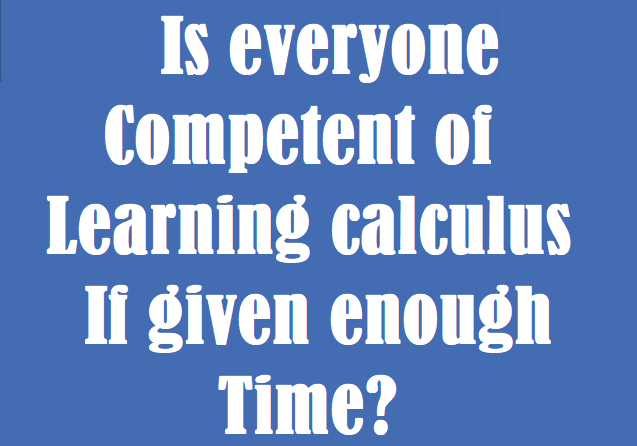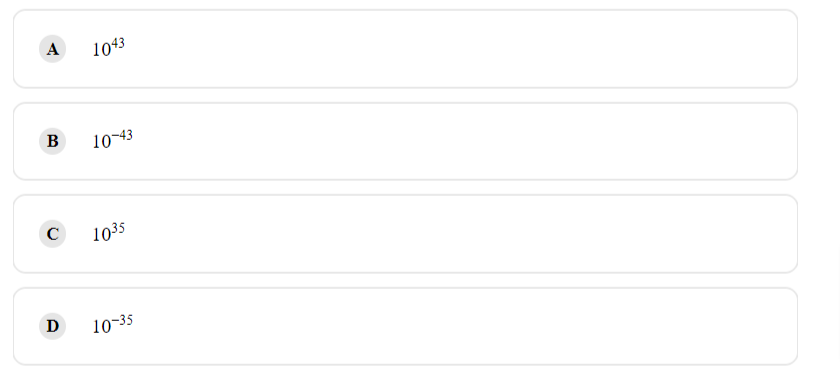Is everyone competent of learning calculus if given enough time?
Is everyone competent of learning calculus if given enough time?
Is everyone competent of learning calculus if given enough time? To be very precise about this, no. But before you get discouraged, I would say that I could teach the basics of calculus to 90% of every one. If you don’t let it scare you, the procedures can be quite straight forward and mechanical. Its like learning to swim, even though there may be some very deep water below you, once you can swim the depth is not so significant.
In the States, they make a big deal about it, as if it was a right of passage into the church of higher math. Its not.
Is everyone competent of learning calculus if given enough time?
- I’m driving in my car. The milometer tells me how far I’ve gone.
- How does this change with time?
- Well that depends on how fast I’m going. We call this speed, and its the rate at which distance changes with time.
- This is (calculus warning) ds/dt.
- can I change the speed? Yes, there’s a pedal on the floor, and when I press it down with my foot, the speed changes. The amount by which it changes, is called the acceleration.
- This is (calculus warning) dv/dt, and its the rate at which my speed changes with time.
- There, now, that wasn’t too hard was it? You have just started calculus.
- I do not believe that everyone is capable of learning calculus if given enough time.
Whatever a human does requires motivation. Some motivations are external and the person does not own the motivation. When you are a child you do what your parents tell you to do. Your motivation is you want to please your parents.
Some motivation is internal. You own the.motivation. You want to be an astronaught. You do a lot of research and you find out that one path to becoming an astronaught is becoming an engineer. Engineers must know calculus. You are.motivated to learn calculus so you can become an astronaught.
I have no motivation to learn calculus. No amount of time would give me the motivation to learn calculus.
Here I will make a list of what you can do to prepare yourself in 2 weeks.
Day 1 - 5:
1.) Review Basic Geometry of lines and shapes. You should know how to find area and volume of any basic 2D and 3D figures. Try to memorize and understand the formulas of the following figures: Rectangle, Circle, Trapezoid, and a Cone.
2.) Get familiar with algebraic expression and learn how to solve and graph linear functions. You can learn this in youtube or Khan Academy but to practice this, I would suggest you buy an algebra book or if that is out of your budget, a SAT math book will do. Also after you get familiar with graphing linear functions, learn how to solve systems of equations. Also don’t forget to study linear inequalities and learn how to graph them in Cartesian Coordinates!
3.) Review Indices and the rules of exponents. Learn how to simplify algebraic expressions containing powers or exponents by understanding the rules in algebra. Then try understanding the difference between powers and logarithms but still don’t get too far with logarithms. After that learn how to simplify radical expressions starting out with only numbers.
4.) Learn how to factor quadratic trinomials and learn about the special ones too like a^2-b^2=(a-b)(a+b). After you have mastered this, learn how to solve quadratic equations with the quadratic formula. Learn everything that you can learn on graphing these parabolas but don’t go into conic sections just yet. You will most likely encounter Conic Sections while investigating about parabolas.
5.) Learn how to factor higher order polynomials by learning something called synthetic division. Also learn how to graph polynomials like x^3–1 and learn how to factor them.
Day 6–10
6.) Learn how to divide polynomials and try to understand the basic concept of the fundamental theorem of Algebra and Arithmetic. After that, learn about the remainder and factor theorem. When you finish that, learn about rational functions and its graph. Understand the concepts of Vertical and Horizontal Asymptotes.
7) Learn how to solve exponential equations and learn how to graph exponential functions. After that learn the properties of logarithms and solve equation evolving normal logs and natural logs. After that learn how to properly graph them. These two go well together!
8.) Learn about elementary functions. Understand the definition of domain and range and learn how to find them in all of the functions you learned so far. This is very essential in calculus! Learn how to conjugate functions and practice finding the inverse function. Understand their concept, do not memorize!
9.) Learn EVERYTHING about trigonometry. Before studying trigonometry, I recommend you to back up and review Pythagorean Theorem and Triangle Congruence and its geometric properties. You can study everything about trigonometry in Khan Academy or in the textbook I highly suggest you to buy and study.
10.) Learn about Arithmetic Sequence and Series. After that, study about the sigma notation and its usage. Then, learn about the geometric sequence and its progression. If you have studied about sigma notation then you can try to understand Infinite Geometric Series. Learn the definition of divergence and convergence. After that, study about Pascal’s Triangle and the binomial Theorem. This is going to be very useful in Calc II classes!
Day 11–14:
11.) Learn about Matrix Algebra. That is right, learn how to add, subtract, and even multiply matrix. After that learn how to find the determinant of a matrix and learn how to find its inverse. While reviewing about Systems of Linear equations, and try studying something called the Cramer’s Rule and Jordan-Gauss Elimination. After that, learn the basics of linear transformation. After that, study about equations of planes and its properties. By the end of this, you should be able to find a determinant of a 3x3 matrix and solve linear systems of 3 or more variables!
12.) Learn about vectors (Basic Algebra and Geometry of Vectors) and Dot & Cross product. Learn and understand the definitions and try to prove the Laws of Cosine using the dot product. After that, apply your knowledge to free projectile motion in physics because it is all about that. Review what you learned in day 11 and start mastering parametric equations. You should learn how to graph them and its properties.
13.) Conic Sections! Study everything about circles, ellipse, hyperbolas, and parabolas. Learn their geometric properties! You can search them up in youtube and they would give you a sold explanation.
14.) Polar Coordinates. Again, everything about coordinates is in youtube.
This is how I would spend my time studying for those 2 weeks you have. I always tell my students to UNDERSTAND not MEMORIZE. Is useless to memorize all of them and forget the next day.
Related Post










Leave a Comment